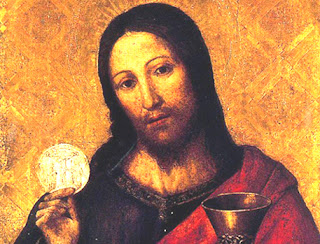"It is without profound sadness to announce to you that At 7:35 this morning, the Bishop of Rome, Francis, returned to the home of the Father. His entire life was dedicated to the service of the Lord and of his Church. May his soul and the souls of all the faithful departed, through the mercy of God, rest in peace. We pray too for the Church, that the Holy Spirit may console us, as we grieve the loss of the Holy Father, and that she might be guided in the election of a new Pontiff."
- - - -
For much of the secular world, Easter is over now. They're back to normal life. For disciples of Jesus Christ, however today is the second day of a fifty day season of glory—reveling in, celebrating, reflecting upon, basking in the light of the most important thing that ever happened. Jesus Christ rose from the dead, just as he said he would.
News of the death of Holy Father Pope Francis has certainly
cast a pall over our easter joy. And yet, we are grateful for the gift of his
life, his pontificate, and the fact that he was able to celebrate one last easter
with the Church whom he loved and served with his whole life.
We commend his soul to the Lord, and recall, that the
resurrection of Jesus Christ is the sign of hope for him and for us all. Had
Christ not risen from the grave, our faith and our hope would be in vain. But
Christ is risen, and death does not get the last word, for Pope Francis or for
any of Christ’s beloved.
The Catechism says, “The Resurrection of Jesus is the
crowning truth of our faith in Christ, a faith believed and lived as the
central truth by the first Christian community; handed on as fundamental by
Tradition; established by the documents of the New Testament; and preached as
an essential part of the Paschal mystery along with the cross: Christ is risen
from the dead! Dying, he conquered death; To the dead, he has given life.”
“To the dead, he has given life.” What powerful words these
are! Not merely poetic sentiment, but the very heartbeat of our faith. This
truth resounds through every Easter Alleluia we sing, every Mass we celebrate,
every moment we live in Christ.
Today, we face the loss of Pope Francis—a shepherd who
taught us tirelessly that death is not an end, but a doorway. The sadness we
feel today gives way to hope, because the risen Christ extends His victory over
death not only to Himself but to each of us.
As we continue our Easter journey, let us renew our
commitment to Christ, who transforms sorrow into joy, despair into hope, and
death into life. May our hearts echo the Easter proclamation with renewed
confidence: Christ has risen; truly He is risen! Alleluia
With faith in the Risen Christ, who conquered death and gave
life to the dead, we present our prayers to our merciful Father:
For Pope Francis, our beloved Holy Father who has returned
to the Father’s house; that he may now rejoice forever in the glory of the
Risen Lord, whom he served so faithfully and joyfully.
For the Church throughout the world, as we mourn the loss of
Pope Francis; may the Holy Spirit bring consolation, peace, and strength to all
believers, and guide the College of Cardinals as they prepare to elect his
successor.
For the whole world, particularly those who do not yet know
or believe in the joy of the Resurrection; may this Easter season open their
hearts to Christ, who gives life and hope to all.
For all who grieve today, especially those who mourn Pope
Francis, and all who have recently lost loved ones; may the Resurrection of
Christ assure them that death does not have the final word, but that through
Christ, life triumphs over the grave.
For our parish community, that during this sacred season of
Easter, we may renew our commitment to Christ and become ever more confident in
sharing the Good News of His Resurrection.
For all the faithful departed, especially Pope Francis, and
those whose faith is known to God alone; may they experience eternal joy and
peace in the risen presence of Christ, who has conquered death.
Father of mercy, hear our prayers as we rejoice in the
Resurrection of your Son. Comfort our hearts, guide your Church, and make us always
faithful witnesses of your Son, who lives and reigns for ever and ever. Amen.
















